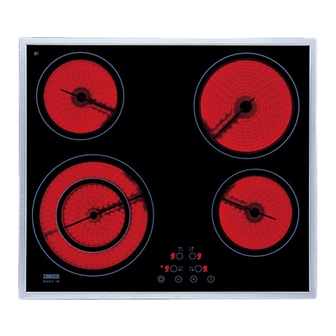Zanussi ZKT 623 LB Instrucciones de uso e instalación - Página 4
Navegue en línea o descargue pdf Instrucciones de uso e instalación para Placa Zanussi ZKT 623 LB. Zanussi ZKT 623 LB 23 páginas. Elektric ceramic glass hob

Important Safety Information
The safety of this appliance corresponds to the
acknowledged rules of technique and to the law on
appliance safety. The safety measures existing as a
matter of self-understanding would, however, not cover
all of possible risks of accidents.
Moreover, we feel compelled as the manufacturer to
make you familiar with the following hints on safety.
Electrical safety
This appliance must be installed by qualified
D
personnel.
Repairs to the appliance should only be carreid
D
out by authorised service enginneers. Improper
repairs can lead to injury or serious malfunction.
If your appliance need repairing please contact
your local Service Force Centre.
Please observe this instruction, otherwise the
guarantee will not cover any damage that may
occur.
Built--in appliances must be installed in built--in
D
cupboards and worktops. The cupboards have to
be located and fastened in a way that they are sta-
ble. The protection against accidental contact re-
quired by the VDE will then be ensured.
Damaged appliances must not be installed.
D
Do not use the hob if the ceramic glass is dama-
D
ged:
- switch off the cooking zones,
- disconnect from the electricity supply.
A special electronically controlled safety--switch--
D
off makes sure that all cooking zones are swit-
ched off automatically after a defined time, in case
there will be no variation of settings.
Safety for children
This appliance is designed to be operated by
D
adults only. Do not allow children to play with the
product or tamper with the controls.
This hob is fitted with a safety device of the elec-
D
tronic control which prevents playing children
from turning the hob.
Safety during use
This hob is intended for domestic cooking only. It
D
is not designed for commercial or industrial
purposes.
The appliance gets hot when in use. In case of ca-
D
reless handling there is danger of burning one-
self at the heating zones.
Do not use the cooking zones to heat the room.
D
Take care when plugging electrical items into
D
mains sockets near the hob. Connecting leads
must not come into connection with the hot
surface or vessels.
Hot oils can ignite very quickly. Do not leave the
D
hob unattended when preparing foods in pans of
oil, i.e. frying chips.
The sensor technique provides best--possible sa-
D
fety with the manipulation of the appliance, but to
the same extent it needs care when setting coo-
king zones, output or periods of time.
After use make sure that the appliance is
D
switched off.
Safety when cleaning
Ensure that all heating zones are switched off
D
while cleaning the hob.
For safety reasons do not clean the appliance with
D
a steam jet or high pressure cleaner.
How to avoid damaging your appliance
Do not use the hob surface as a working surface
D
or for storage.
Do not use the cooking zones with empty pans or
D
without pans. This could cause damage to the
pans or the hob.
Ceramic glass is insensitive to temperature shock
D
and very robust, however, it is not unbreakable.
Hard and sharp objects, in particular, can damage
the cooking surface if they fall on it.
Do not use cast iron pots or pans with damaged
D
bases that are rough or burred. Scratching may
occur when the lids are slid.
Do not place any pans on the hob frame. Scrat-
D
ching may occur or the paint damaged.
Ensure that liquids containing acids, e.g. vinegar,
D
lemon limescale removing agents do not come
into contact with the hob frame, otherwise matt
spots will appear.
If sugar or a dish containing sugar comes into con-
D
tact with a hot cooking zone and then melts, re-
move the soiling immediately whilst still warm,
using a glass scraper. If it cools, damage to the
surface may occur.
Keep all items and materials that melt away from
D
the ceramic glass surface, e.g. plastics, alumi-
nium foil or oven foils. If something of this nature
should melt onto the ceramic glass surface, it
must be removed immediately using a glass scra-
per.
24
